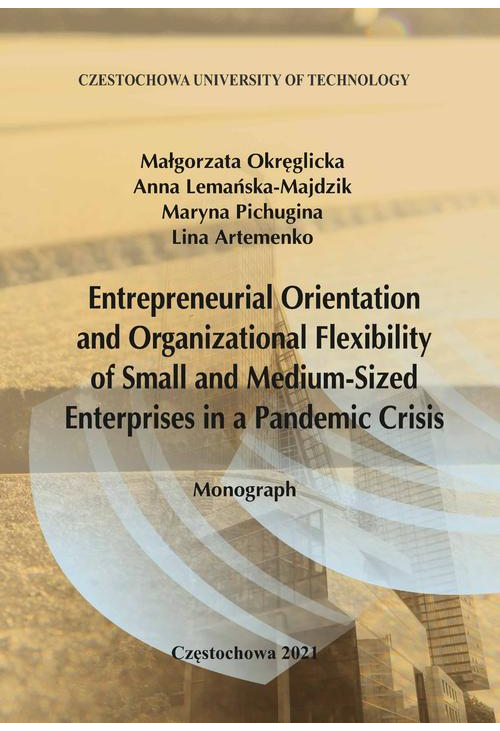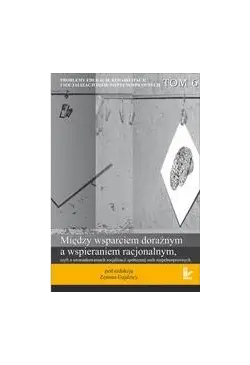
- Za darmo
ebook Entrepreneurial Orientation and Organizational Flexibility of Small and Medium-Size Enterprises in a Pandemic Crisis
Odkryj unikatowe spojrzenie na przedsiębiorczą orientację i elastyczność organizacyjną małych i średnich przedsiębiorstw w trakcie kryzysu pandemicznego. Ta fascynująca monografia autorstwa Małgorzaty Okręglickej, Anny Lemańskiej-Majdzik, Maryny Pichuginy i Liny Artemenko z Politechniki Częstochowskiej przenosi Cię w świat analizy strategicznej i zarządzania.
Wydana w 2021 roku w języku angielskim, ta publikacja cyfrowa zapewnia głęboki wgląd w kluczowe aspekty działalności sektora małych i średnich przedsiębiorstw (MŚP). Ebook zawiera cztery rozdziały, które tworzą spójną całość. Pierwszy rozdział przedstawia specyfikę aktywności sektora MŚP, charakteryzując go zarówno ilościowo, jak i jakościowo w Polsce i na Ukrainie. Autorzy podkreślają rolę MŚP w budowaniu innowacyjnej gospodarki oraz omawiają wyzwania i bariery związane z efektywnym zarządzaniem tymi przedsiębiorstwami.
Drugi rozdział skupia się na orientacji przedsiębiorczej MŚP, prezentując multidimensionalne podejście do tego konstruktu. Eksploruje on definicje i wymiary orientacji przedsiębiorczej, takie jak autonomia, proaktywność, gotowość do podejmowania ryzyka, innowacyjność oraz agresywna konkurencyjność. Trzeci rozdział analizuje elastyczność organizacyjną w działalności przedsiębiorstw, podkreślając różnorodne podejścia do tej cechy i jej wpływ na funkcjonowanie MŚP. Ostatni rozdział zawiera studium przypadku z sektora MŚP, oparte na wynikach własnych badań jakościowych przeprowadzonych w ośmiu przedsiębiorstwach, czterech małych i czterech średnich, działających zarówno w Polsce, jak i na Ukrainie.
Monografia ta stanowi cenne źródło wiedzy dla osób zainteresowanych zarządzaniem strategicznym, przedsiębiorczością oraz problematyką MŚP w kontekście kryzysu pandemicznego. Ebook dostępny jest do pobrania w formacie PDF i stanowi doskonałe uzupełnienie każdej biblioteki ebooków.
Zanurz się w świecie najlepszych ebooków o zarządzaniu, biznesie i ekonomii. Kup e-booka lub pobierz bezpłatną wersję próbną i odkryj, jak przedsiębiorczość i elastyczność organizacyjna mogą wpływać na sukces małych i średnich przedsiębiorstw. Czytaj wygodnie na dowolnym urządzeniu i ciesz się bogatymi treściami tej fascynującej publikacji cyfrowej.
Spis treści ebooka Entrepreneurial Orientation and Organizational Flexibility of Small and Medium-Size Enterprises in a Pandemic Crisis
IntroductionChapter 1. The Specificity of the Activity of the SME Sector
1.1. Characteristics of the SME Sector
1.2. The Role of Enterprises from the SME Sector in the Economy of Poland and Ukraine
1.3. The Specific Features of SMEs Management
Chapter 2. Entrepreneurial Orientation of Small and Medium-sized Enterprises
2.1. Organizational Entrepreneurship as an Area in the Theory of Business Management
2.2. The Concept and Multidimensionality of Entrepreneurial Orientation
2.3. Entrepreneurial Orientation in Small and Medium-sized Enterprises
Chapter 3. Organizational Flexibility in the Activities of Enterprises
3.1. The Essence and Definitions of Organization Flexibility
3.2. Dimensions of Flexibility in the Activities of Enterprises
3.3. Flexible Activities in Small and Medium-sized Enterprises
Chapter 4. Case Study in the Sector of Small and Medium-sized
Enterprises
4.1. Research Methods
4.2. Case Study in Polish and Ukrainian Small and Medium-sized Enterprises
4.3. Summary of Case Study Results
Conclusion
References
List of Tables
List of Figures
Szczegóły ebooka Entrepreneurial Orientation and Organizational Flexibility of Small and Medium-Size Enterprises in a Pandemic Crisis
- Wydawca:
- Politechnika Częstochowska
- Rok wydania:
- 2021
- Typ publikacji:
- Ebook
- Język:
- angielski
- Format:
- Liczba stron:
- 178
- Miejsce wydania:
- Częstochowa
- ISBN dla wersji papierowej:
- 9788371938337
Recenzje ebooka Entrepreneurial Orientation and Organizational Flexibility of Small and Medium-Size Enterprises in a Pandemic Crisis
-
Reviews (0)

Na jakich urządzeniach mogę czytać ebooki?
- Za darmo















@CUSTOMER_NAME@
@COMMENT_TITLE@
@COMMENT_COMMENT@